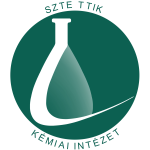
Research topics
2024. April 25.
The research topics in the Institute of Chemistry are constantly changing, so we recommend visiting the website of the given department and the person leading the research in relation to the currently ongoing research. Some topics that are pursued in each department:
Department of Applied and Environmental Chemistry
- Heterogeneous catalysis, photocatalysis
- Examination of micro- and mesoporous materials
- Nanotechnology and materials science
- Applying various stucture characterization instruments, including electron microscopy
- Research in environmental chemistry
- Theoretical chemical research
- Study of aqueous colloidal systems
- Applied electrochemical research (e.g. electrochemical water splitting, CO2 reduction)
- Nonlinear dynamics and kinetics
- Heterogeneous catalysis, surface chemistry and material structure research
- Research on nanostructured materials
- Theoretical reaction dynamics
- Research on anti-cancer and anti-diabetic metal complexes and metal ion-based therapeutic agents that can be used in the treatment of neurodegenerative diseases
- Modeling of metal-containing proteins/enzymes, design of artificial enzymes
- Development of analytical separation techniques
- Research on concentrated aqueous solutions and on layered double hydroxides
- Development of elemental analytical techniques
- Examination of biologically active, anti-cancer compounds
- Stufying the mechanism of asymmetric reactions
- Immobilization of metal complexes and examination of their possible catalytic application
- Research of systems held together by hydrogen bonds





